A Place of Healing
Hello, all my fine fellow Beast Tamers! I am so sorry for being so awol for so long! As you may recall, when last I wrote, I was en route to Portland Providence Medical Center’s special facility for the treatment of cancer and less invasive surgeries on high risk patients, “the Oregon Clinicâ€. This was my second stay at the Clinic and again, I was incredibly well cared for… every possible step was taken to understand my condition(s) and ensure that my special needs were met and a positive outcome achieved. I was treated not only with skill by wonderful professionals with specialized learning and equipment, but also with respect and kindness; even, dare I use a word that is an anathema in the modern world of medicine, with love. And because of the power of my experience and the gratitude and respect I feel for those who cared for me there, I wanted to write about this special place and my time there.
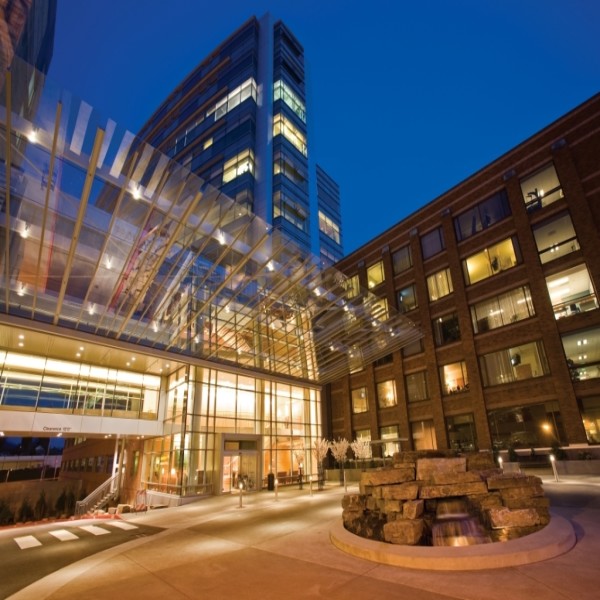 Â Â Â Â Â Â Â Â Â Â Â Â Â The Oregon Clinic, Portland Providence Medical Center
             The Oregon Clinic, Portland Providence Medical Center
I know that this piece may come off like an advert for Portland’s Providence Medical Center and the Oregon Clinic, but no, I haven’t been paid for my services! Between my own very deeply appreciated experiences there and all I’ve learned since I sat down to research the organization’s history, values, mission and practices… well, what can I say? This is a very special place run and staffed by very, very special people. And you, my readers, are also very special people with very special needs and I want you to know that there is somewhere safe that you can go to have those needs met. Because in my long life of far too many medical experiences, starting with a pre-mature birth and a childhood spent in and out of hospital, I have never experienced better care.

For those of us with rare diseases, hospital stays, and surgery in particular are fraught with danger and fear. And unfortunately, those fears are not unfounded; we often end up facing an appalling lack of understanding that makes for traumatizing and alienating experiences at the very least; potentially deadly experiences at worst . Whether we suffer from RSD/CRPS, Elhers Danlos, Systemic Mast Cell Disease, Environmental Illness/Multiple Chemical Sensitivity, Dysautonomias, or like me, a veritable herd of such pernicious Beasts, oft times few but the most specialized health care professionals have even heard of the condition(s) that dominate our lives, and if they have may be decades behind the research, perhaps even think of our illness as a mental or “somatoform†disease, or ourselves as problem patients; prerhaps even “addicts†for taking the medications properly prescribed for our disorders…. and treat us accordingly. (“Accordinglyâ€, as I’ve had the misfortune of learning, seems to mean that if one actually did have a mental, emotional, or addictive problem, one should be treated with disdain, lack of basic human dignity, compassion, or caring. What a tragic, terrible world we humans sometimes create! )
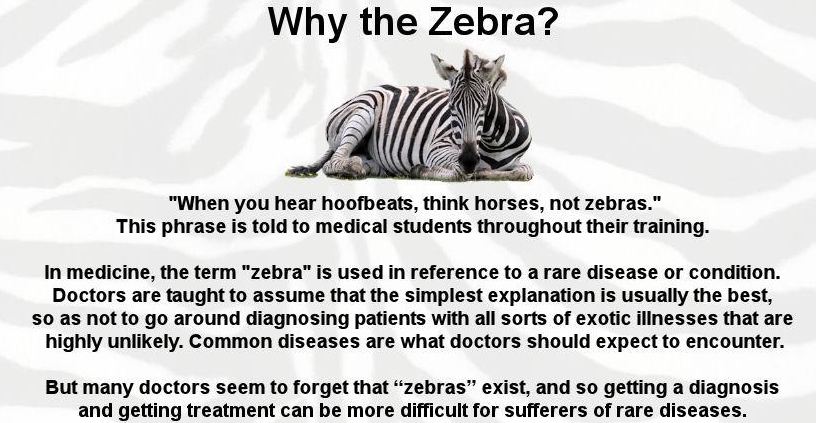
When we "Zebras" are in trouble, in critical condition, perhaps needing surgical intervention, we are often in no shape to have to fight to educate care givers who are not interested in learning, or deal with the terrible combination of ignorance, arrogance and unkindness so many of us have had to face before. Even writing these words fills me with anger and grief, for my younger self and all my fellow Beast Tamers, and all that we have gone through. It also twigs me to more writing that MUST be done… on how to best educate when you do need to, how to effectively deal with the politics of negative hospital experiences, and how to handle the anger, grief and terror of these times. However, those are birds of another feather! For now, let me tell you about this wonderful Place of Healing and about my experience there.
First of all, Portland Providence is a hospital, in every sense of the word. At its Latin roots, the word derived from hospitium which, according to Wikipedia, signified “the relation between guest and shelterer, hospitality, friendliness, hospitable receptionâ€. I certainly experienced that! In the middle ages, the word “hospital†meant, variably, depending upon the time and place, an almshouse for the destitute, a shelter for pilgrims (travelers with a spiritual calling), or a place of education, and only later, in the 1500’s, became the word for a place of healing. Providence is all of these, while meanwhile winningawards for its use of electronic technologies in medical record keeping and clinical practice... bringing ancient and modern together in their drive to provide excellence in health care.
Providence is also that most mysterious of entities in the American Privatized Health Care System, a non profit health care provider! Though they are a Catholic institution, their care is not by any means restricted to those who share the same faith. Providence began close to 200 years ago, when a young Canadian woman (how cool is that?), Marie-Émilie-Eugène Tavernier, called Amelie, moved by the suffering of the destitute in her community, began to feed those who hungered but had naught at “the table of the King†which she had set up in an unused room of her father’s house. Amelie’s mission continued for her entire life and beyond; becoming first an order of nuns called the “Sisters of Providenceâ€, and now a massive health care and charitable organization, of which the Oregon Clinic, which has some of the most specialized equipment and lauded specialist physicians and surgeons in North America, (and at which I received such exemplary care) is one of the crowning jewels.
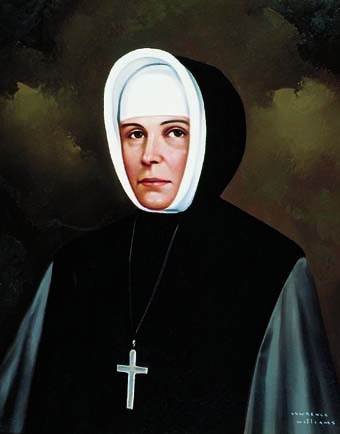
Approximately 150 years ago, 5 Sisters of Providence moved to the rapidly developing west coast of North America to provide for the needs of those that were not being met by others, especially the most vulnerable…. apparently, this group of caring women did not feel that those who struggled with poverty, or with mental, emotional or addictive illness were sub-human or undeserving of care, because those folks at the “bottom of the barrel†were primary among those they focused their care upon. They began establishing hospitals, schools, and orphanages from California to Alaska… many of which were designed by one of the nuns, a brilliant woman, Mother Joseph, who has been honoured as “the first Architect of the Pacific North West†as well as revered for her humanitarian, educational, and health care work, especially for the poor and down trodden.
The Providence nuns' ministry grew as rapidly as the communities they served and the ideals and dedication they had lives on in the institutions and initiatives that continue under the Providence name to this day. The hospitals, hospices, nursing schools, charitable foundations, research organizations and other “businesses†they so successfully manage provide employment, education and care for many, and they take the funds they generate, add to them by soliciting partnership from other organizations and turn around to give to those most in need… still caring for those that so many others would deem unworthy of care. To put it in their own words; “The Providence Mission reaches out beyond the walls of care settings to touch lives in the places where relief, comfort and care are needed. Our community benefit spending is about treating not just the patient, but the whole community. ..Providence connects families with preventive care to keep them healthy, fills gaps in community services and provides opportunities that bring hope in difficult times.â€
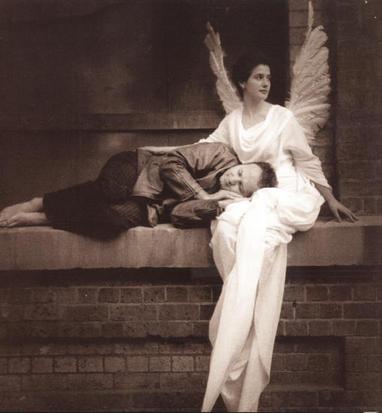
In 2013, that “community benefit funding†totaled (Are you ready for it? Because I just about fell off my chair...) $951million! The vast majority of that money was spent on providing medical care for those with no or insufficient medical insurance, making up for the lack of government funded care, and providing medical care without prejudice or judgement for the very most needy and neglected… in whatever way truly met their needs. The rest went to a massive range of philanthropic programs; schooling (including an online nursing program designed to help single mothers and others who would have difficulty accessing a brick and mortar institution), research into such matters as state of the art medical options and the cost effectiveness of social justice , to end of life care, bereavement camps for children who have lost their parents, programs to help families dealing with cancer (regardless of whether they are receiving their care through Providence), to specialized equipment, programs and cost free or subsidized services to children with every complex care need imaginable (including such innovations as a multi-sensory environment for "medically fragile" children with neurological impairment who cannot speak or move on their own) , help for people in developing nations, dental care and addiction resources for the homeless… housing for the homeless… well, obviously the list goes on…. and on, and on. I am so deeply impressed to learn that this organization that provided such wonderful care for me is providing such a massive range of service in this world !
How did I, as a Canadian patient, come to be treated at Portland Providence Medical Center, and the Oregon Clinic? Well the first step in that journey was that of being sent home to die by my local health care professionals. From 2007 to 2010, I had been suffering an indescribable repeating nightmare in and out of my local BC hospital which ended with me being basically sent home to die. For the sake of my hard won peace, I won’t go into the many horrific details of filthy conditions (including being informed after multiple invasive ERCP’s that I would need to have testing for a number of infectious diseases including HIV/AIDS because they hadn’t been properly cleaning their equipment!), poor care, abuse, ignorance, arrogance and outright assault I experienced, but in the final analysis, I was abandoned by the doctors and staff of our local hospital system; sent home on a stretcher being told that they would “provide palliative care when the time comes†after they made a series of surgical errors that they were neither willing nor able to address.
To be fair, it started out well enough… due to the massive surgical risks of my condition (at that time undiagnosed Systemic Mast Cell Disease with a history of frequent life threatening anaphylactic reactions to medications of almost every kind, with widespread unexplained allergic reaction of every kind to foods, inhalents, and especially many common chemical compounds) I had been told for decades that I was not a surgical candidate. None the less, the day came when it was do or die and I was admitted to the local hospital with acute abdomen and had emergency gall bladder surgery. At the time of that first hospitalization, though I met with some supreme arses in the emergency room, the surgeon at least, and some other staff as a result, were initially willing to follow most of the guidelines laid out by Dr. Rea of the Environmental Health Center of Dallas, (another exemplary care center), who had overseen my care for decades, and, wonder of wonders, I survived. However, I was left with both stones (by accident) and stents (without informed consent) in my biliary tract after wards, and entered into a life of hell where endless episodes of unbearable biliary spam and pain (caused by blockage from the stones and reaction to the stents and RSD/CRPS spreading to the biliary system) dominated my family’s reality.
This local institution was a very different creature than those of the Providence system; a partially privatized hospital within a previously great but now decaying (due to sabotage from within) universal medicare system. Over time, (with the help of a provincial government seemingly determined to undermine all that was best in the Canadian health care system) it had become in part a private (for profit) corporation in which the doctors themselves had financial partnership, and which was slowly privatizing system after system within the hospital to the detriment of cleanliness, nutrition, patient care and employee satisfaction… As for me, although I am perhaps the least litiginous person on the planet, we have theorized that their legal beagles came to the conclusion that I was some sort of risk and they went on the offensive.

In any event, we went through a nightmarish witch hunt, including attempts to label me an “addict†(I had lived through over a decade of whole body RSD/CRPS with NO pain medications, but was at that time being treated (appropriately enough, thanks to my extreme drug sensitivity) with pediatric doses of a preservative free opiode medication… and had been stable on those doses for several years and was strongly supported by my own very well trained practitioners)…or “mentally ill†(although, as confirmed by my family and long term physicians, I had no psychiatric history of any kind and even their own psychologists declined to concur with the concept); in the end it was clear that the place was incredibly dangerous to me, and that they had neither the will nor the skill to help me survive their errors.
So, sent home to die, I turned to the Almighty Internet. There must be someone, somewhere out there who could help me… my family still needed me, and I was not ready to lie down forever. I spent many hours digging, sent letters that were not answered, and finally, one to a very kind doctor who seemed a likely possibility at a Washington hospital. Through him, my searches finally led me to Portland Providence’s new center for Cancer and Less Invasive Surgeries on High Risk Patients, the Oregon Clinic, and in particular, to Dr. Paul Hansen. I investigated, and Portland Providence Medical Center itself had been consistently  awarded for excellence of care and patient safety, and the Oregon Clinic is renowned for everything from its award winning design to its highly skilled surgeons, specialized training and equipment. I saw that Dr. Hansen was very highly regarded; he had won numerous awards for his work, especially in the area of complex biliary surgeries... surely if anyone could help me, he could. I sent him a personal letter, telling him of my situation and asking if he could help.
When his answer came in the affirmative, I went to see the one doctor from the local hospital who had seemed to have a soul, and asked his help in getting the government funding to go down to the Oregon Clinic for treatment. To his very great credit, he clearly and openly apologized for the treatment I had received in hospital and for his “impotence†in stopping what had happened. I didn’t know doctors even knew how to apologize! (Apologies myself to the very human and decent ones I know...this is just the voice of an awful lot of bad medical experiences talking...) It was very deeply validating to hear after the terrible experience my family and I had endured… and gave me renewed hope in humanity to some degree. He also did what it took to get the funding in place. I will be forever grateful to him for both of those acts. Because of the second, I was able to receive care at the Oregon Clinic of Portland Providence Medical Center for the first time in 2010.
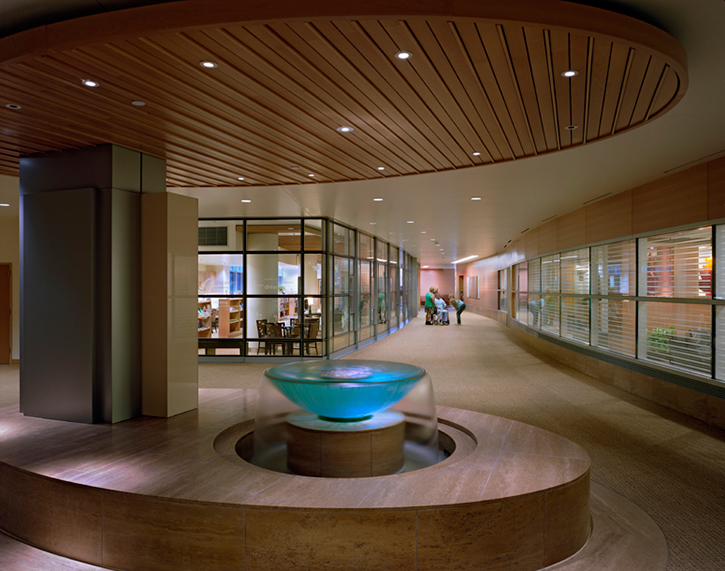
The contrast between its clean and spacious halls and the mess and chaos of our deteriorating local institution was only the first of many such remarkable contrasts. The entire staff was professionalism itself. My surgeons; Dr.Hansen and his young internist Dr. Hammill, were both all that I had been led to believe; highly skilled, caring, efficient, dedicated. I was especially comforted by the personal contact with Dr. Hammill, whose clear and empathetic communication went a long way to making me feel ready for the surgery. We were amazed and filled with gratitude for the efforts of the exceptional head OR nurse Marcia Weaver, Â Â Â Â who arranged for information booklets about my condition to be distributed to everyone who would be taking part in my care, and for meetings between my husband Terry and the heads of each department from pharmacy to anesthesiologist to recovery room and floor nursing prior to the surgery.
My safe care was in particular made possible by the wonderful pharmacist Katie Hufft, who worked with Dr. Rea, with the pharmacist in my local hospital (who was also wonderful and probably one of the main reasons I survived the original surgery) and with my husband and myself to ensure that all medications were available for my treatment and for any contingencies that might arrive. Every single staff member we dealt with was exceptional; JT Cervantez, in charge of security, helped us with a number of our special needs. The nurses and house doctor were truly wonderful; they supported Terry as my primary care giver, and provided exemplary care. I made it through the surgery, which was a total success, and traveled back home to my family, free of the stones and stents which had been causing such horrific distress, and had been threatening my life. I knew that if, Gods forbid, I ever needed surgical care again, I would move heaven and earth to get back down to that exceptional place of healing.
The recovery was surprisingly relatively smooth, and I had some 6 glorious months with no biliary pain. My distress when I first experienced that terrible sensation again cannot be described, and when it became clear that the RSD/CRPS had indeed spread to the biliary tract I was deeply depressed. It is still a part of my life, and though I have more tools with which to fight it, acute biliary distress is still a potent and desperate part of most of my RSD/CRPS pain flares. I lay the blame for that spread on the unnecessary procedures, pointless delays, and lack of care I experienced during the years of struggling to find care in my local hospital system.
Months became years, and several secondary health issues became gradually more pressing. One of the surgical incisions in my navel, thanks no doubt to Ehlers Danlos, had herniated, and over time it not only grew, but also, I began to have horrid, acutely painful episodes where the hernia got “stuck†and could not be pushed back in. My GP was of the opinion that surgery would be the only answer. She also told me that if it got truly stuck, it could be life threatening; it could cause peritonitis, gangrene, or other lovely outcomes… and worse yet, I wouldn’t have time to get to Oregon. I wouldn’t even have time to get to Vancouver if that happened. I would be truly stuck; stuck with the local hospital, which was my greatest nightmare. I truly doubted I would survive their “care†again.

Meanwhile, my dentist also informed me that the RSD/CRPS osteopenia in my jaws that had necessitated removal of two perfectly good molars on the right side of my face had spread and that the need for removal of the corresponding teeth on the left side was increasing quickly. I'd successfully put it off for years with stringent oral hygiene, but he feared systemic infection if I put it off much longer. The previous teeth had been removed without anaesthetic of any kind, without pain medication of any kind… it had been truly medieval, and the pain and trauma had caused a spread of the neuropathic RSD/CRPS pain to the right side of my face; an indescribably terrible thing. I have many tricks to remove myself from pain in other parts of my body (tricks I hope to be sharing over time with you, dear readers), but I have yet to be able to distance myself from my face… our faces are where we live… and I was acutely fearful of having not only one side but both sides of my face aflame with that remorseless electrical agony. I’d often thought when the facial pain was bad, “Thank all good spirits it’s only the one side; if it was both I would lose my mind.†The very likely possibility of spread to the left if I went through repeated dental trauma froze me to my very bones. If I was to be forced to have healthy molars yanked from my bones yet again, this time I wanted anaesthesia, despite the terrible risks and my very deep and reasonable fears of those risks.
While I told myself that both of those troubles could wait, at least for a while, a pelvic ultrasound put a little more fire under the pot… I had been found to have an abnormally thickened endometrium, which, along with such symptoms as periods that had lasted 14-20 days a month for the last few years, and had become increasingly about flooding, flooding, flooding (which had not been helpful for my long term anemic condition) spelled a possibility of uterine cancer that could not be ignored or put off. I was instructed by a lovely and efficient local gynecologist to get to a facility willing and able to deal with the complexities of placing me under general anesthetic as soon as I possibly could to “rule out†that looming possibility. There was no question in my mind where I was headed.
We had some delays; enough to make my family and I begin to worry pretty hard, but eventually, thanks to the Canadian medical system, the support of the aforementioned gynecologist, and the magic touch of my wonderful pain management specialist (and past politician… one of the good guys… with the knowhow of the system and the secret handshakes to boot) Dr. Thomas Perry Jr. the funding was approved and we were on our way. The journey was full of challenges. All you “Masties†out there can guess what kinds of scary monsters we had to fight to get there safely, but thanks in part to the Mast Cell Disease treatment protocols that I have so recently added to my survival toolkit, and thanks to my dedicated support team (my husband and daughter who came with me and fought/evaded the beasts as we came up against them and the shore support from my son at home who was guiding us via internet technology through and around some of the lairs…) we made it!
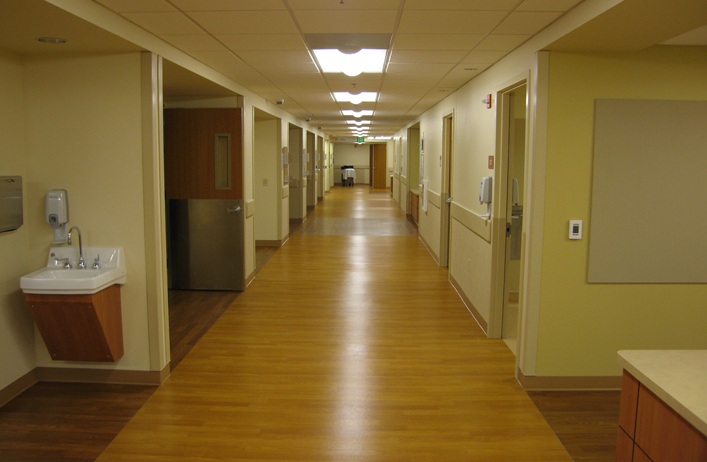
As before, I was impressed by the cleanliness and beauty of the Portland Providence and Oregon Clinic facilities; their wide clutter free halls, the art exhibits lining the corridors, the fountains and statuary, the words of comfort and inspiration inscribed on the walls. Again, the staff willingly and fully cooperated with the protocols required by both my mast cell disease and RSD/CRPS. My husband Terry was given access to my room, which had been stripped of all hospital linens, cleaning products etc. This was the room from my previous visit, which had been chosen in part for its quiet location, away from hustle and bustle, assorted human busy-ness and mechanical noises that might have triggered mast cell degranulation, allergic reactivity, or an increase in neuropathic pain. He wiped down the surfaces with food grade hydrogen peroxide, put all of our organic cotton linens in place, and got the room and anti-chamber set up to provide for my needs, including the small refrigerator that was provided for my organic foods. The staff helped every way they could, and left my family and I to do what we needed when that was what we needed most. Anyone entering my room was screened at the nurses station regarding scented products, pesticides etc. and that no one entered my room without reverse isolation procedures; gowns, masks, and unpowdered, latex free gloves were worn. My soaps and hydrogen peroxide were used by my care givers, rather than the hospital standards. Every precaution that could be taken was taken.
Meanwhile, from the moment of my first call, the wonderful people of the Oregon Clinic, with Dr. Chet Hammill at the helm this time, had responded immediately, working hard to sort out the complexities of providing safe care for me. As Dr. Hammill had so impressed me with his kindness during our last visit, I felt very comfortable in his care; the fact that he has a brilliant mind (He left a career in Aerospace Engineering... yup, that's right, rocket science... to become a surgeon!), is highly educated and extremely skilled really didn't hurt either! Dr. Hammill took the very wise attitude of “stick with what worked beforeâ€, and as much as possible they did. The same lovely, quiet room I stayed in before was reserved for me, and as many staff as possible who had helped to provide care for me previously were called in to be on hand again. Unfortunately, our wonderful head OR nurse Marcia had since retired, but Dr. Hammill’s hard working assistant Trinh leapt into the fray to arrange all of the different specialists and care providers who would make my surgery and recovery happen, as safely as possible. It was arranged that my gynecological surgery would be performed by Dr. Clea Caldwell, a young surgeon who had been awarded for her Special Excellence in Endoscopic Procedures by the American Association of Gynecologic Laparoscopists in 2009. And my dental extractions would be done by Dr. Bryan Bell (I later learned that I had perhaps the most overqualified specialist possible; he is a renowned facial reconstructionist, capable of such wonders as creating a new nose for a patient who had been ravaged by an accident), while wonderful Dr. Hammill himself would take care of the hernia repair. A pretty impressive team!
Luckily for me, our wonderful pharmacist Katie was still on board and got to work right away sourcing and preparing the medications for my care. She met every challenge; when she found there was a shortage of the anesthetic I had previously tolerated (preservative free propofol), she procured, from all around the States, literally the very few vials in the country for me. We consulted repeatedly, including one very long call to go over every last item, its ingredients and sourcing, to make sure all was in readiness; this call was on a Saturday, and she apologized to me for taking my time on a weekend! Meanwhile, when I later tried to express my gratitude for her diligence and focused care, she humbly replied; “ The entire Providence Pharmacy team was involved in your care behind the scenes...and it was the priority of the entire team to keep you safe during your hospitalization. I truly believe that you would receive the same level of care from this amazing group of people whether I was here or not. The Providence Vision is ‘Know me, care for me, and ease my way.’ It is what we strive for with every patient we serve.â€
This dedication is apparent everywhere in Portland Providence Hospital. To read their Mission Statement and Values shows you the high standard they strive to reach; let me tell you, from my experience and my research, they truly meet every single one! The fact that it is a Catholic organization is subtly present in statuary of its founding sisters, and the morning and evening prayer that is quietly broadcast over the intercom. But it is a gentle, non-invasive presence. On the night before my surgery, when I fought against the fear that was flooding through me with the swift coming reality of going under anesthesia, I asked Terry to open the door so that I could better hear the evening prayer. These are the words that I heard: “May we be open to the mystery, uplifted by the simple, and entranced by the unknowable..†If ever any words could have expressed my own very deeply held spiritual beliefs and given me comfort, it was these words. I looked out to watch the sun setting over the roofs of Providence, including the medieval looking church tower, and watched the birds swoop and dive… uplifted by the simple, I tried to open myself to the mystery of the unknowable, and have faith in the skills of these dedicated people who would provide for my care. I remembered the words of Dr. Chet Hammill when I had expressed my fears during one of our conversations; “We are all completely focused on keeping you safe; yes, surgery is always inherently dangerous, and more so for you, but I truly believe it will all be alright. We will get you through this.†I focused on waking up after surgery to see the faces of my loved ones, and placed myself in the hands of fate, the unknowable, and the people of Providence.
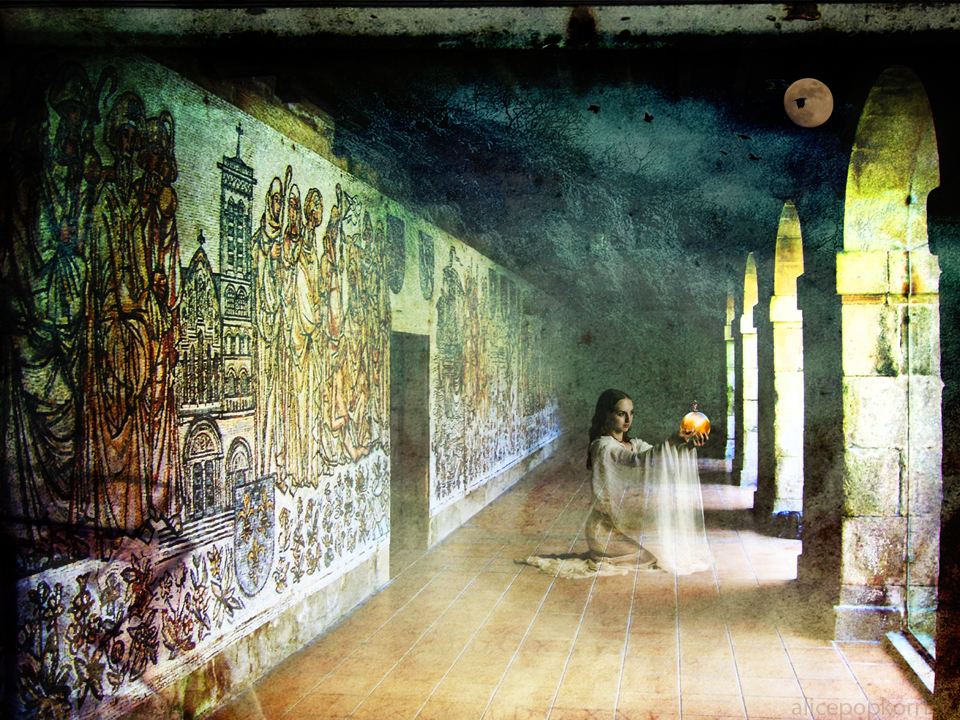
Which brings me to the nursing staff! I cannot say enough in praise of the wonderful men and women who cared for me. Of course, I am a great fan of nurses; in my life I have found that nurses often know more than doctors… especially about their patients’ individual needs, and I have been privileged to know many great nurses. What made these nurses of Providence extra special? Well I asked each of my nurses to tell me their story; the story of how they became a nurse. And though the answers varied, one thing was clear, each of these nurses had a calling, a vocation. It was especially clear to me that the men who cared for me have been brought to the career of nursing through a calling. Although my husband Terry and my daughter Naomi provide much of my care, there were times that we had to have help from nurses, even for my personal care. I am a very private person, and I wondered, when I met my first nurse and he was male, if I would be comfortable receiving personal care from a man who is not intimately known to me. The answer was yes, and I believe that it was because of the calling that made these men nurses first and foremost as they cared for me.
That calling was also made apparent by the joy with which my nurses provided their care. Yes, it seems that Providence is an exemplary employer; they've won awards for it (yeah, no surprise there!), and many of my nurses told me that they would be loathe to work anywhere else after experiencing being part of the Providence team, even if they had to work night shifts, or accept other less than ideal circumstances. In my investigations for this article I was struck by even Providence's employee commuter benefits, showing care for both their employees and the environment; they offer transit passes, shuttle service from the rapid transit station, bike racks and showers for those who want to ride… I also read about their initiatives to make sure that employees who are experiencing family losses, death, illness, or other challenges are supported financially and emotionally… obviously Providence strives to provide an excellent work environment… but it is more than just that. And the happiness these fine people feel in doing their job and being a part of this special health care team spills out on those around them, even as I could see that joy in some of the old photos of Providence nuns throughout their history.
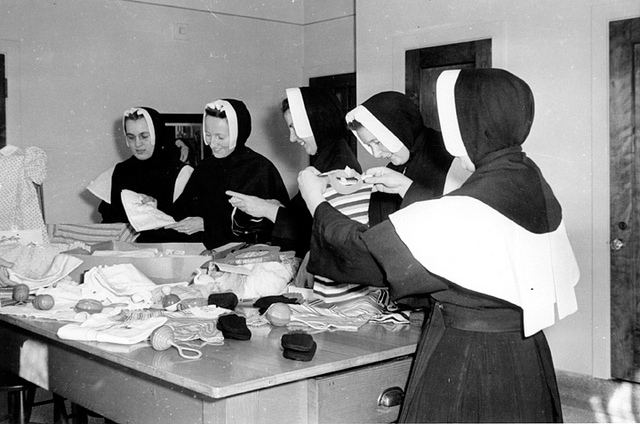
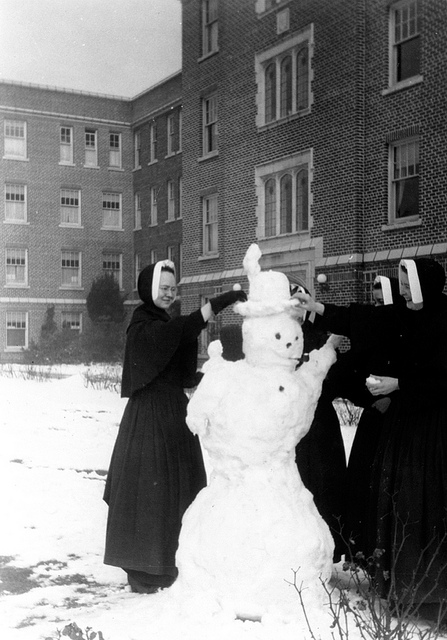
As for the level of skill and attention to detail shown by the staff who provided my care; in my research, I was not surprised to learn that Providence nurses have been singled out for national awards for nursing excellence. I was also very moved to read the words of Deborah Burton, chief nursing officer for Providence; “Being a nurse requires a special calling. Being a Providence nurse is the greatest calling of all. I am so very proud of each of our over 20,000 nurses, working around the clock in every community we serve. We are here for you, your family, each other and our communities. I am honored to serve with this talented and dedicated Providence caring community. What a privilege to declare, “I am a Providence nurse.â€Â I can only agree, and hope to express my gratitude.
And as with the nurses, so with every single staff member I interacted with; I was treated not only with dedication, a very high level of skilled medical attention in every detail, but with respect, kindness, and, though professionalism was ever apparent, with a feeling of individual to individual recognition and care that I can only call love. So, to all my 7th floor nurses; Rainbow, Kevin, Lynnea, Jen, Garrett, Christina, Violet and Taryn; to Nurse Manager Tim Cruz and Director of Oncology Eva Edwards, who helped ensure our special needs were met, to Katie Hufft and all the pharmacists in her team, to Trinh, and all the other assistants and administrative staff who made my care possible, to my most wonderful, special, shining and highly skilled surgeon Dr. Chet Hammill, to gynecologist extraordinaire Dr. Clea Caldwell, to my delightfully overqualified and skillful dental surgeon, Dr. Bryan Bell , my very kind and focussed anaesthesiologist, Michael Kane, and my OR nurses, Sandra, Katherine, Mary, Edward, and Carly, along with each and every one who contributed to this very positive experience; who kept me alive with their skills (both this time and during my first visit to the Oregon Clinic, including of course, Dr. Hansen &MarciaWeaver) … to anyone else I’ve missed mentioning by name (I know there must be many behind the scenes whose work made a difference)... to all the staff of Providence, and even to those long ago nuns who began this incredible caring initiative; my deepest respect for your dedication, skills, and expertise, and my heartfelt gratitude for your exemplary and truly loving care. I thank you!
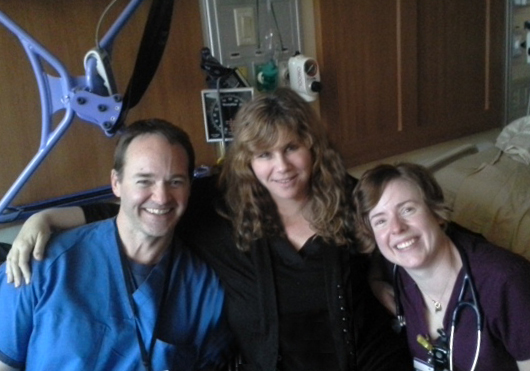 Â Â Here I am with two of my most special kindred spirits from Providence; Chet and Rainbow!
  Here I am with two of my most special kindred spirits from Providence; Chet and Rainbow!
To my friends and readers who, like me, suffer from rare diseases requiring complex care and attention to detail, for whom surgery is a terrifying, often life threatening prospect (more than for the average bear), I want to tell you that I truly believe that you will be as safe as it is possible for someone “like us†to be, in the hands of these special people in this very special place. It was more than worth the stresses and difficulties of the journey for me to receive such exceptional care! I don’t know about you, but for me, just knowing that they are there makes a difference to my level of apprehension and worry as I step into each day of this oh, so very challenging life. And so, my fellow Beast Tamers and friends, I recommend to you, with every bone in my body and every beat of my heart; (should, God forbid, the need arise) this very special Place of Healing: The Oregon Clinic, at Portland Providence Medical Center.
Â
Â
Â
Â
Author: Lili Wilde
Date Posted: 2014-08-02 Date Last Edited: 2015-01-31 21:40:51
